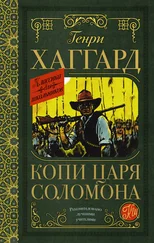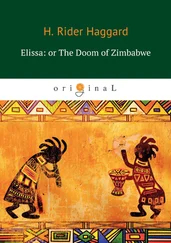“Marie Marais, why do you cry?” I asked.
She turned, tossing back the locks of long, black hair which hung about her face, and answered:
“Allan Quatermain, I cry because of the shame which has been put upon you and upon our house by that drunken Frenchman.”
“What of that?” I asked. “He only called me a pig, but I think I have shown him that even a pig has tusks.”
“Yes,” she replied, “but it was not you he meant; it was all the English, whom he hates; and the worst of it is that my father is of his mind. He, too, hates the English, and, oh! I am sure that trouble will come of his hatred, trouble and death to many.”
“Well, if so, we have nothing to do with it, have we?” I replied with the cheerfulness of extreme youth.
“What makes you so sure?” she said solemnly. “Hush! here comes Monsieur Leblanc.”
Chapter 2
The Attack on Maraisfontein
I do not propose to set out the history of the years which I spent in acquiring a knowledge of French and various other subjects, under the tuition of the learned but prejudiced Monsieur Leblanc. Indeed, there is “none to tell, sir.” When Monsieur Leblanc was sober, he was a most excellent and well- informed tutor, although one apt to digress into many side issues, which in themselves were not uninstructive. When tipsy, he grew excited and harangued us, generally upon politics and religion, or rather its reverse, for he was an advanced freethinker, although this was a side to his character which, however intoxicated he might be, he always managed to conceal from the Heer Marais. I may add that a certain childish code of honour prevented us from betraying his views on this and sundry other matters. When absolutely drunk, which, on an average, was not more than once a month, he simply slept, and we did what we pleased—a fact which our childish code of honour also prevented us from betraying.
But, on the whole, we got on very well together, for, after the incident of our first meeting, Monsieur Leblanc was always polite to me. Marie he adored, as did every one about the place, from her father down to the meanest slave. Need I add that I adored her more than all of them put together, first with the love that some children have for each other, and afterwards, as we became adult, with that wider love by which it is at once transcended and made complete. Strange would it have been if this were not so, seeing that we spent nearly half of every week practically alone together, and that, from the first, Marie, whose nature was as open as the clear noon, never concealed her affection for me. True, it was a very discreet affection, almost sisterly, or even motherly, in its outward and visible aspects, as though she could never forget that extra half-inch of height or month or two of age.
Moreover, from a child she was a woman, as an Irishman might say, for circumstances and character had shaped her thus. Not much more than a year before we met, her mother, whose only child she was, and whom she loved with all her strong and passionate heart, died after a lingering illness, leaving her in charge of her father and his house. I think it was this heavy bereavement in early youth which coloured her nature with a grey tinge of sadness and made her seem so much older than her years.
So the time went on, I worshipping Marie in my secret thought, but saying nothing about it, and Marie talking of and acting towards me as though I were her dear younger brother. Nobody, not even her father or mine, or Monsieur Leblanc, took the slightest notice of this queer relationship, or seemed to dream that it might lead to ultimate complications which, in fact, would have been very distasteful to them all for reasons that I will explain.
Needless to say, in due course, as they were bound to do, those complications arose, and under pressure of great physical and moral excitement the truth came out. It happened thus.
Every reader of the history of the Cape Colony has heard of the great Kaffir War of 1835. That war took place for the most part in the districts of Albany and Somerset, so that we inhabitants of Cradock, on the whole, suffered little. Therefore, with the natural optimism and carelessness of danger of dwellers in wild places, we began to think ourselves fairly safe from attack. Indeed, so we should have been, had it not been for a foolish action on the part of Monsieur Leblanc.
It seems that on a certain Sunday, a day that I always spent at home with my father, Monsieur Leblanc rode out alone to some hills about five miles distant from Maraisfontein. He had often been cautioned that this was an unsafe thing to do, but the truth is that the foolish man thought he had found a rich copper mine in these hills, and was anxious that no one should share his secret. Therefore, on Sundays, when there were no lessons, and the Heer Marais was in the habit of celebrating family prayers, which Leblanc disliked, it was customary for him to ride to these hills and there collect geological specimens and locate the strike of his copper vein. On this particular Sabbath, which was very hot, after he had done whatever he intended to do, he dismounted from his horse, a tame old beast. Leaving it loose, he partook of the meal he had brought with him, which seems to have included a bottle of peach brandy that induced slumber.
Waking up towards evening, he found that his horse had gone, and at once jumped to the conclusion that it had been stolen by Kaffirs, although in truth the animal had but strolled over a ridge in search of grass. Running hither and thither to seek it, he presently crossed this ridge and met the horse, apparently being led away by two of the Red Kaffirs, who, as was usual, were armed with assegais. As a matter of fact these men had found the beast, and, knowing well to whom it belonged, were seeking its owner, whom, earlier in the day, they had seen upon the hills, in order to restore it to him. This, however, never occurred to the mind of Monsieur Leblanc, excited as it was by the fumes of the peach brandy.
Lifting the double-barrelled gun he carried, he fired at the first Kaffir, a young man who chanced to be the eldest son and heir of the chief of the tribe, and, as the range was very close, shot him dead. Thereon his companion, leaving go of the horse, ran for his life. At him Leblanc fired also, wounding him slightly in the thigh, but no more, so that he escaped to tell the tale of what he and every other native for miles round considered a wanton and premeditated murder. The deed done, the fiery old Frenchman mounted his nag and rode quietly home. On the road, however, as the peach brandy evaporated from his brain, doubts entered it, with the result that he determined to say nothing of his adventure to Henri Marais, who he knew was particularly anxious to avoid any cause of quarrel with the Kaffirs.
So he kept his own counsel and went to bed. Before he was up next morning the Heer Marais, suspecting neither trouble nor danger, had ridden off to a farm thirty miles or more away to pay its owner for some cattle which he had recently bought, leaving his home and his daughter quite unprotected, except by Leblanc and the few native servants, who were really slaves, that lived about the place.
Now on the Monday night I went to bed as usual, and slept, as I have always done through life, like a top, till about four in the morning, when I was awakened by someone tapping at the glass of my window. Slipping from the bed, I felt for my pistol, as it was quite dark, crept to the window, opened it, and keeping my head below the level of the sill, fearing lest its appearance should be greeted with an assegai, asked who was there.
“Me, baas,” said the voice of Hans, our Hottentot servant, who, it will be remembered, had accompanied me as after-rider when first I went to Maraisfontein. “I have bad news. Listen. The baas knows that I have been out searching for the red cow which was lost. Well, I found her, and was sleeping by her side under a tree on the veld when, about two hours ago, a woman whom I know came up to my camp fire and woke me. I asked her what she was doing at that hour of the night, and she answered that she had come to tell me something. She said that some young men of the tribe of the chief Quabie, who lives in the hills yonder, had been visiting at their kraal, and that a few hours before a messenger had arrived from the chief saying that they must return at once, as this morning at dawn he and all his men were going to attack Maraisfontein and kill everyone in it and take the cattle!”
Читать дальше












